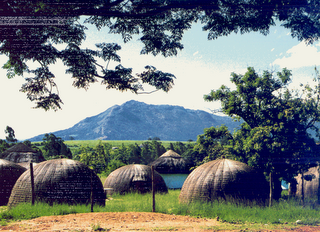So, here I am - An introduction
So, here I am.
The following paragraphs are from the desk of Ryan Phelps, a pediatrician from
On August 18th, 2006, I boarded a plane in
Swaziland has the highest HIV prevalence in the world. Swaziland has a king, and he has many wives (in excess of a baker’s dozen). Swaziland has around a million Swazi’s living in it, and the landmass is approximately the size of New Jersey, though I wish I knew of another place about the size of New Jersey to avoid having to make this particular comparison. I make no apologies for the bakery analogy, however, for the king only marries once his chosen mate has a bun in the oven. What an immaculate concept.
The many-ovened king is a beloved man here, lording over a kingdom steeped in tradition, including culinary ones. He has inherited Swazi law and custom and the coveted duty of perpetuating it and (perhaps) benefiting from it. He does not cook. All Swazi men, king down to humblest pawn, make (and occasionally break) the rules around here. I say this without judgment, for I am ill-qualified (and otherwise reluctant) to charge or indict my hosts. It is very early spring here, and the weather is warming. When the chicks that hatch in a few weeks can be found within the small Styrofoam containers being sold at the local "Chicken Lickin", I will write a more seasoned editorial. Until then, I sincerely mean it when I say that I appreciate the kingdom of Swaziland granting me the opportunity to live and work here. In a world where few own a passport or ride a motorized vehicle, my doing both with a monarch’s blessing is a rare privilege, a trifecta of sorts.
My privileged voyage to Swaziland has two primary purposes: to help treat children (and adults) with HIV and teach other health care providers to do the same. I aim to do both to the best of my ability. As I do this, I plan to draft what one might call “field narratives” to share my experiences. I will do this with the best of this novice writer’s ability also. All efforts undertaken by amateurs (including amateur writers) must come with a disclaimer, and here is mine: I have never kept much of a diary nor written anything of import. For that matter, I have yet to even create an unimportant and yet entertaining read. Knowing as little as I do, however, I can assure you, the reader, that though I have only the most basic idea of why I am here, you will be among the first to know of my successes, failures, and lessons learned. Even if I am unable to accompany my observations with insight, I pledge to record my observations carefully, offering a sort of looking glass into this part of the world.
The near and distant future of Swaziland, including the small role I am to play within it, is uncertain. At present, the worst of the modern-day plagues surrounds me. It is not like previous plagues, for which death was the only option. This disease can be treated. Still, millions die. This is why this ill-qualified writer writes; I believe strongly in what we are doing here.
My faraway backdrop is Swaziland’s capital, Mbabane, a clean town of approximately 80,000 perched above a large valley and among small stony mountains. I do not know the type of rock, but they are a sandy-beige and their effect is most inviting. It is the type of terrain that looks good on the cover of magazines that sell high-tech, expensive outdoor gear. For this and other reasons, my impression of Mbabane is that it looks (abounding natural beauty) and feels (crisp, sunny early spring days and friendly people) like a place where one would not mind living. Of course, I am told that the honeymoon when changing continents and cultures can last six months, so my descriptors may change after I have bedding here for a longer spell.
Traditional Swazi village
I live in a large, comfortable house with a sheltered, suburban feel and sufficient bedding for any potential guests. Hot water and electricity—yes, usually. Central air—no. My yard has an avocado tree and is surrounded by “bluegum” trees and pines. The avocados fell to the ground and rotted just before my arrival. Darn. Within the nearby pines are dozens of pendulous, tear-shaped nests belonging to small weaver birds that I have yet to google and speciate (Swazi internet is glacial, and yes, the verb ‘google’ is now officially part of Webster’s). The weaver nests look a bit like avocadoes but are well beyond reach, firmly attached, and, as far as I can see, inedible.
I guess I will have to wait around a while for the free avocadoes. I need to cultivate an onion, tomato, and jalapeño patch so that I can make guacamole when that time comes. Of course, I cannot make margaritas without a lime tree and agave cactus plant. It seems as though I have a lot of gardening to do to minimize homesickness.
Though Tex-Mex is but a dream, Mbabane has similarities to Denison, Texas. At night, in my back yard, frogs croak and crickets chirp. Occasional woodpeckers peck. Cars are rarely heard.
Unfortunately, there is a very un-Texan, sickly rooster nearby that occasionally calls out to the local henhouse, though the call is more like a cough or wretch than a cock-a-doodle-doo. Actually, when he crows in the middle of the night, the sound closely resembles that a belch would make if one where being choked while belching. I hope that the hens share my opinion, for should this rooster father a dozen little belchers, my community’s charm (and similarity to rural Texas) would be in grave jeopardy.
My home does not resemble that of most Swazi homes, which are organized within a traditional rural patriarchic, patrilineal village. This ex-patriot will have to defer on the definitions of these anthropological categories, for I am not an anthropologist.
The streets of Mbabane are mostly paved (and mostly free from trash) as are the main highways heading west (to Johannesburg), south (to Durban and Capetown), and east (to Maputo). The town center is lively and equipped with shops selling the familiar (KFC, Woolworth’s, Shell) and the unfamiliar (specific examples require familiarity). All that one truly needs, and more, can be found in Mbabane.
I navigate my new town on the left side of the road in a car with its steering wheel on the right. I am allowed to take a left on a red light. All of this frightens me, so I bought a mountain bike for my commute to work (1.5mi). Besides, there are all of those alluring mountains on all sides, so I had to gear up.
The clinic where I work is called the Baylor College of Medicine - Bristol-Myers Squibb Children’s Clinical Centre of Excellence, Swaziland, or “COE” for short. It is a spacious, newly-constructed building where children and parents can receive HIV testing and treatment. It walls are adorned with Swazi handicrafts, cultural garb, and various local photos. One hanging reed mat has woven into it the words, “Feel at home”, and it is indeed a cozy, welcoming place. Within these walls, a small number (in the hundreds) of children and family members receive medicines that have the potential to allow them to grow old though infected with HIV. My job is to try to increase this number (with a goal of >1,000 patients on antiretroviral treatment within a year) and expand pediatric HIV services in other parts of the country.
A child dies of HIV/AIDS every 60 seconds. This is disease that destroys children, families, and continents. Worse still, it destroys hope. It is a disease that leaves me feeling under-qualified despite spending my teens and twenties pursuing qualifications. Though HIV is an intimidating virus, excellent treatment exists. A very small proportion of Africans with HIV receive this treatment.
There is a catchy saying here. It goes something like: “Let’s put one and one together and see if we get two.” I have no delusions that I am going to save the world, but putting effective, available medicines and dying human beings together adds up. Failing to do so does not. So, here I am.
Labels: Other stories





2 Comments:
Dear Ryan
I hope you don't mind me contacting you this way. You don't actually know me - I've just come across your blog. I'm currently undergoing selection for a position as a maternal and child health officer under an Australian volunteer program. The host organisation is a local NGO - Swaziland Infant Nutrition Action Network (SINAN) - I'd be interested in any intel you have about the organisation (and maybe the opportunity to exchange emails about some of the challenges of working in the area). The other Australian volunteers I have contact details for are working in non-health sectors, so your advice would be wonderful. My email address is annabauze@hotmail.com
Many thanks
Anna
ryan,
i am from barcelona, spain. i lived in swaziland from november 2005 until october 2006. i was working there in an energy-related project. i am comming back at the beginning of december 2007. i would like to meet you and hear about your project to see if i can help in some way.
please, contact me at nyinyu@hotmail.com
Post a Comment
<< Home